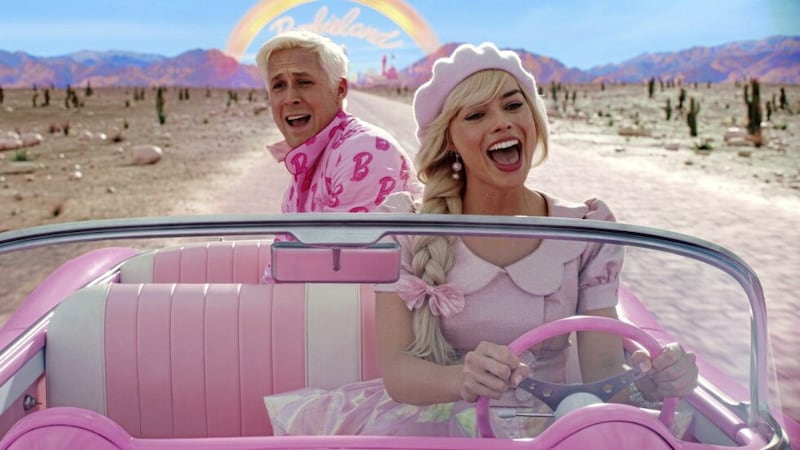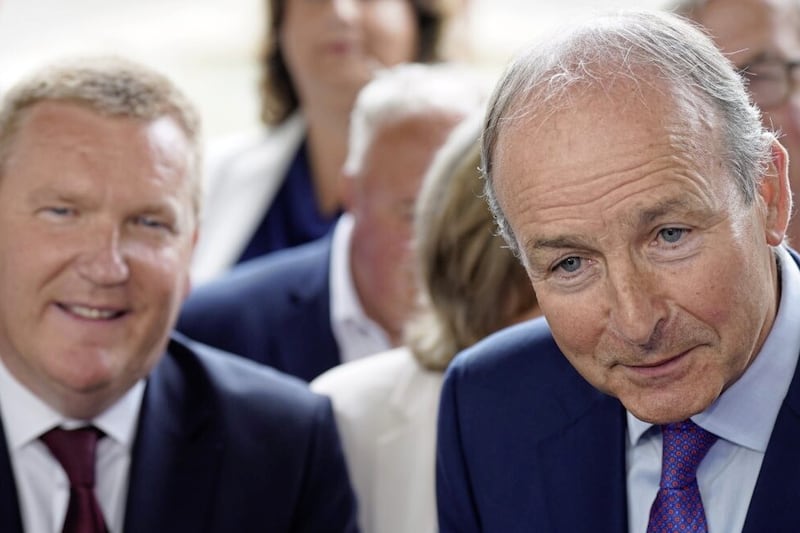There’s a scene in the Barbie movie where Margot Robbie is driving out of Barbieland towards the real world, singing along to a song by The Indigo Girls which starts off: “I’m trying to tell you something about my life, maybe give me insight between black and white. And the best thing you’ve ever done for me is to help me take my life less seriously.”
The song’s lyrics are basically the entire plot of the movie.
I’m a long-time fan of The Indigo Girls, so I loved the way the song was woven into the movie throughout.
I didn’t read any reviews of the film before I went to see it because I wanted to have an open mind. Besides, before I got there, it was less about the movie itself and more about the event.
Read more:
Review: Barbie - how do we rate the new movie?
Uncovering Ireland's Barbie history
GAA fans compare iconic jerseys to Barbie outfits
Four MacBride girls and six daughters of MacBrides dressed in pink and took the 212 bus down to the fancy new cinema in Belfast last Saturday evening as a summer outing. The plan was a couple of cocktails, some dinner, watch the movie and head home at a reasonable hour, having had a pleasant evening that the younger ones would enjoy the most.
I wasn’t expecting too much of a hard-hitting film, but within moments of the opening, Barbie’s feminist credentials are set out for us.
We have Barbie President, Supreme Court Barbie, Astronaut Barbie (created even before a woman joined the space programme), as well as wheelchair Barbie and Body Positive Barbie.
Barbie was created, we are told, so that girls could play with dolls that did not only put them in the role of mother or care-giver, but allowed her to envisage herself as anything she aspired to be.
It doesn’t shy away, either, from the criticism that a doll designed to give young girls the opportunity to visualise themselves as anything they wanted to be also created an unrealistic, unattainable body image. That’s something which is reinforced in the current generation by social media “influencers”.
Piers Morgan stated: “If I made a movie that treated women the way that Barbie treats men, feminists would want me executed.” It’s funny because his response taps exactly into the masculine fragility Ken displays in the film.
Barbie Land Ken seeks attention from his “girl” whilst real world Ken swaggers with the misplaced confidence of a middle-aged uncle dancing at a wedding. Morgan’s not so shocking lack of self-awareness entirely misses how Hollywood has treated women for decades.
Barbie succeeded in showcasing, albeit in a tongue-in-cheek way, what a matriarchal society could look like. Women from all ethnicities, with different skills and abilities, coming together to live in economic and social equality.
In Barbie Land, men were treated as an extension of women, the reverse of in our society where women are often treated as an extension to a man without having agency in her own right. In using such a blunt tool, the movie creates a space for discussion of core principles of feminism, equality, patriarchy and activism, as well as challenging our own perceptions and prejudices.
And just as stereotypical Barbie struggled with her place in the world and her unfulfilled expectations, our conversations on the late bus home were about how the Barbies believed that they, just by existing, have solved the problems of sexism and misogyny in the world.
They have become self-satisfied and complacent, not only about the Kens in the population, but also about the outlier Barbies, as represented by the pregnant Midge who didn’t get to say anything or take part in any of the plotting and planning.
Our conversations focussed on how important women supporting women is. Spending time with people who praise you and see the good in you is important, but take notice too of the critical friends who challenge you.
Have aspirations and expectations of fairness. Believe that women and girls have the autonomy to be whatever they want to be without conforming to societal ideals.
Barbie isn’t so much bimbo feminism, more like baby feminism. So much so that the three teen MacBride girls went back to see it again on Monday so they could “get” some of the bits they missed first time around. They’re on a learning journey and I love it.
As Barbie, Gloria and Sasha sang “there’s more than one answer to these questions pointing me in a crooked line”, Barbie shows us that it’s OK to be conflicted and contradictory and confused; that is part of life’s journey. As is the occasional existential crisis.
Second, and perhaps most important, she has reminded us how important the sisterhood is.








